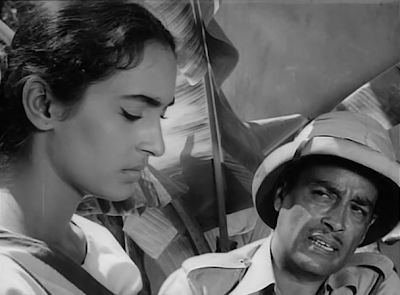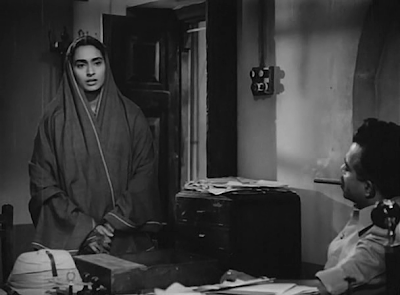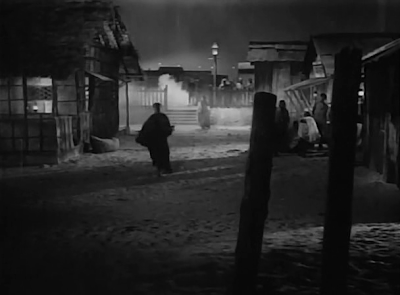 One cannot begin to speak of Bandini without first paying homage to its music. The soundtrack is one of SD Burman's finest, and accentuates the brilliant movie that may be safely called Bimal Roy's last hurrah.
One cannot begin to speak of Bandini without first paying homage to its music. The soundtrack is one of SD Burman's finest, and accentuates the brilliant movie that may be safely called Bimal Roy's last hurrah.Title: Bandini
Year: 1963
Cast: Nutan, Dharamendra, Ashok Kumar, Iftekhar
I approached this movie with skeptisicm- a movie so heavily lauded despite all these years past- overlauded perhaps due to the years past? But boy was I convinced otherwise.
The movie opens with female prisoners (female prisoner= bandini), entering a prison in pre-independence India, being met by the jailer, Chutti Babu, played lechorously by Iftekhar.

Inside the prison, we meet the head jailer and the prison doctor: Devendra (Dharam! smoking hot, at his beautifulest best!)- one of the older female prisoners has been diagnosed with tuberculosis (TB), and they are seeking another female inmate to volunteer as her nurse. This is a job with considerable risk- even through the 70s, TB was rampant and meant possible death.

The one prisoner to volunteer is Kalyani (Nutan), who seems to be hell bent upon taking the hardest of tasks- she is desperately seeking atonement for the crime which has landed her in prison. Kalyani works hard to cure the ailing woman, and impresses the handsome Devendra considerably.

Meanwhile we meet the first in a brilliant soundtrack, "O panchi pyare." A young imprisoned girl sings as she toils, addressing the free birds perching in the yard, comparing her own disbarrment to the bird's ability to fly. The song is a song of happiness, contrasted by the bleakness of the priso, and accompanied by some beautiful visuals.

Meanwhile, Iftekhar is smitten by Kalyani and flirts shamelessly, which she stoicly ignores.

While Kalyani tends to the TB-stricken woman, her troubles rise with the unwanted attentions of Iftekhar, the rumors of her affair with Devendra and the attraction she does sense from Devendra. In the midst of all this, there is a prison uprising, soon bought into control, and the first time we hear the guard's call "sab theek hai," (all's well)- when nothing really is quite well, in the country and within the prison.

The crisis passes, and Dr. Devenra proposes to Kalyani. She refuses, saying she is unworthy, and will not listen to reason- how can she resist that beautiful face?

Kalyani wont listen despite all the attempts of fellow-inmate Bela Bose (in a rare, beautiful role). Devendra resigns and leaves town.

Back home, Devendra looks appropriately sexy in his safari jacket, as he meets his mom.

Meanwhile, the kindly jailer coaxes Kalyani to cough up her story.

And out it comes: Kalyani was a village girl living somewhere in Bengal with her father (Raja Paranjpe playing a post master) and nephew. Kalyani meets a freedom fighter Bikash (Ashok Kumar), being house-imprisoned in her village, and falls deliriously in love with him, though he is clueless. She sings "O jogi tu aaya jabse," (She calls him a saint (jogi) since he is a self-less freedom-fighter, and sings of how she feel in love with him at first sight).

And he does propose and her father agrees to the wedding, but before that Bikash needs to go away to prison....

Months pass, and Bikash shows no sign of returning. At last, to Mukesh's "O Jaanewale Ho Sake To Laut Ke Aana" (you, who are leaving, come back home one day), Kalyani leaves home to go to town and seek Bikash out. She ends up in a nursing home, working as a servant, and attending primarily to one particular peevish patient. Kalyani's dad makes his way to town to find her, but dies in a car crash before he can make it. The same day, she realizes that her patient is Bikash's wife.

Devastated, unstable and furious, Kalyani poisons Bikash's wife in the night, and then unable to bear the guilt of her crime, gives herself up to the police in the morning.

And that's her story. The jailer, deeply sympathetic, secures judicial pardon for her and even convinces Devendra (remember him?)'s mom to accept Kalyani as her daughter in law. Kalyani is free now, and being accompanied by a female warden to Devendra's house.

The train station and the shipyard share a common waiting-house. And who should Kalyani meet there but Bikash, sick with TB himself now (good thing she knows how it nurse it, right?) Further, she is informed by Bikash's friend that Bikash only married the other woman since she was a policeman's daughter, and he could ferret secrets for the freedom movement via her.

And as the last, and one of my favorite songs plays, "mere sajan hain us paar" (my lover is on the other side of the shore, and I am here- o boatman), sung by SD Burman himself. Kalyani must decide now- does she go to the waiting Devendra, or follow Bikash?

I have to admit, the movie made me angry initially. Nothing seems to workout for our protoganist, and there is despair in almost every shot. The impending sense of tragedy looms strong even in the happiest of songs, and it appears as of Kalyani is wilfully embracing sadness.
And yet, the reasoning behind Kalyani's choices isn't too hard to understand- SPOILER ALERT: Her independent spirit is unbreakable- rather than choose Devendra's loving kindness, she prefers to master her own destiny and Bikash's by choosing the latter and fighting for his life END OF SPOILER. That at least is understandable- she chose to fall in love with Bikash whom she hero-worshiped. Driven to crime, she chose to atone for it. Her choices are her own and she stands by them, and the movie conveys that brilliantly.
In Seema (1955), Nutan had captured the ignorance and trauma of the character beautifully, and her Kalyani seems to be an extension of that character, just more matured. The fact that she married in 1959 and gave birth to Mohinish in 1963- her personal growth is apparent on screen for us to see; both movies got her Filmfare best actor awards.

Pros:
1- Its a incredibly compelling movie- every time Nutan's character goes through a hardship, you desperately want things to work out for her, all the while knowing they wont.
2- All the actors work beautifully to highlight Nutan- the movie is tailor made for her. And yet, they fulfill themselves as well: Dhamram, Bela and Ashok are all they could be and very effective- specially Bela, who seldom got such an acting opportunity.
3- The cinematography is brilliant. Color had come to India, but not all directors could afford it. And Kamal Bose, the cinematography doesnt let us miss color for an instant- shadows and light are optimized, as are the outdoor scenes. Angle shots make the drab prison intriguing, and even bring interest to the stagy sets. The shots may remind you of Khamoshi, which he would do a few years later.
4- Bimal Roy (1909-1966) clearly died too early, at a mere 57. He gave us Parineeta, Beegha Zameen, Devdas, Yahudi, Madhumati, Sujata, Naukri- no doubt he could have given us so much more. Like Guru Dutt, a life lost too early.
5- Bandini is an important movie, for the fact that it is one of few Bollywood movies that have focused on the life in a women's prison, and attempted to bring a consciousness of rehabilitation for inmates who had done their time. Their acceptance and integration into society is at least discussed, if not fully conveyed.
6- Can enough be said about its music, its lyrics and songs? Bandini is also important for the fact that it marked almost a 6-year stand off between SD Burman and Lata, where she sings both the love songs, "O Jogi" and "More gora rang lai le,"- and continued to sing for him for years to come. As mentioned, he himself sings the brilliant "Mere Sajan," something he was known to do when he was convinced that he could find no one else to convey a song to his exact specifics. The lyrics for "O Jaane Waale" were by Shailendra, known for his sad songs of separation (his mom died when he was a child- he could never recover from the pain). However, during filming, Bimal Roy and Shalendra argued, leading the then assistant director Gulzar to come up with the rest of the lyrics- his first attempt, and a brilliant one.
Cons:
1- Dharam's love for Nutan is portrayed so delicately and adorably- I wish it had been developed more, and I wish he had more to do than this extended cameo.
2- Nutan is a brilliant actor, but she has a natural elegance that makes her scenes as a village girl hard to believe. Her inherent poise seeps through the rusticity. Despite that, her portrayal of a inmate is par excellence, her pain and misery are palpable.
3- Seriously- !!!!!SPOILER ALERT: Why would a woman choose Ashok over Dharam, blind as she she may be in love?????????? END OF SPOILER!!!!!
Notes:
1- This was Gulzar's third and last work as assistant director, before he took off on his own.
2- Dharam is called "Devendra"- the same name as Abhay in "Dev D." Coincidence?
3- Bleak as it is, Bandini gives us hope- to persist and follow our dreams, impossible as they may seem. I need that just now.









































